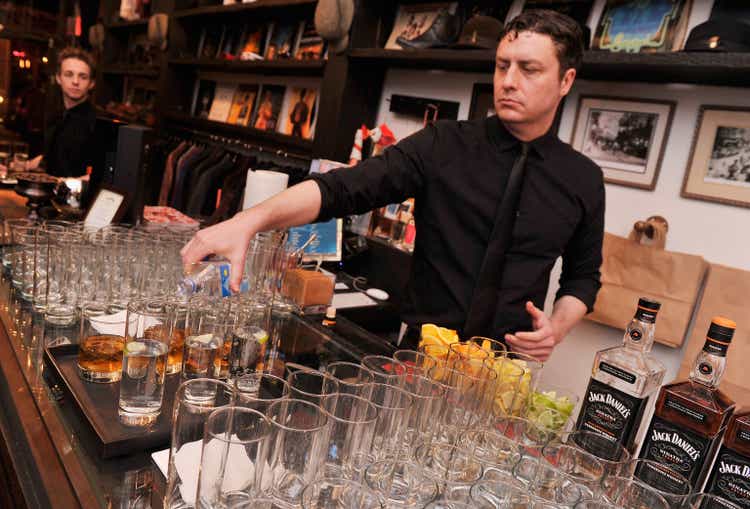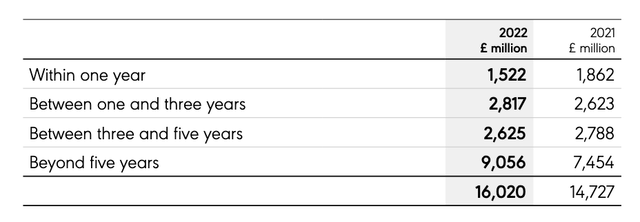Stephen Lovekin/Getty Images Entertainment
In my last article, I talked about British American Tobacco p.l.c. (BTI) (“BAT”) and discussed its strategy for rewarding shareholders. I argued that the company should significantly reduce its dividend payouts in order to deleverage its balance sheet and eventually buy back its shares, which are currently quite cheap. Today, I want to talk about Diageo plc (NYSE:DEO), another British company that is similar in many respects to BTI and shares the same strengths (high profitability, tremendous brand equity) and risks (mainly regulatory issues).
Not surprisingly, both companies reward their shareholders with dividends and share buybacks. However, there is a big difference in cost opportunities that makes the final valuation for the same policy diametrically different between DEO and BTI.
A questionable practice
There are two main ways to return money to shareholders: paying dividends and buying back shares. While the first is a time-tested, reliable method against which there are few counter-arguments, the second (share repurchases) is an instrument that must be managed in a timely, competent, and coherent manner. As the Oracle of Omaha said a few years ago:
Any time you can buy back shares at a lower price than they’re worth, that’s beneficial to the remaining shareholders … but it should be a verifiable margin.
DEO has been consistently buying back its shares: I’ve summarized this activity over the past several years in the table below.
|
FY2018 |
FY2019 |
FY2020/23 |
|
|
Shares repurchased |
59 million |
95 million |
94 million |
Source: Author’s elaboration
Now, is it really Diageo buying its own shares at a price that is less than their value? I would say that this is not the case.
The company certainly seems to be in good shape, with double-digit sales growth, but its free cash flow is about £3 billion, which is almost 30 times lower than the company’s market capitalization. Also, are we sure that spirits companies, and DEO in particular, are a reliable inflation hedge? In the medium and long term, will not the inflationary push worsen profit margins and even sales, much of which, after all, is made up of expensive bottles of alcohol? Will not consumers eventually switch to cheaper alternatives or abandon alcohol consumption altogether to save money to pay the bills?
Faced with a potential weakening of consumer purchasing power, CEO Ivan Menezes wants to increase the company’s market share, targeting a 6% share of the total alcoholic beverage market by 2030 (up from 4% in 2020). This probably explains why marketing spend increased by 25% last year: whether this strategy will work remains to be seen.
The fundamental valuation metrics do not clearly point towards a significant margin of safety for this stock. In the table below, I have compared DEO (again) to another UK staple: BTI.
|
Price/Sales |
Price/Book |
EV/EBITDA |
|
|
Diageo |
5.7 |
11 |
17.5 |
|
BAT |
2.9 |
1.0 |
10.9 |
Source: Author’s elaboration
I’ll take the risk of appearing repetitive here, but it looks like BAT should continue its share buyback, while DEO needs to stop it at these price levels.
What to do in lieu of share buybacks
There are certainly a number of value-enhancing actions DEO could take with the money it would save from its share buyback programs. First and foremost, it could increase its dividend payout. As shown in the chart below, dividends have steadily increased over the years (in British pounds). Over the last five years, the payout has increased by about 17%, an average annual growth rate of 2%. However, at current rates, the yield is quite low, at just over 2% at the time I am writing this.
|
2018 |
2019 |
2020 |
2021 |
2022 |
|
|
DEO’s dividend |
65.3 pence |
68.6 pence |
69.9 pence |
72.5 pence |
76.2 pence |
Source: Author’s elaboration
Consequently, DEO’s management should primarily consider increasing dividends rather than buying back shares. Moreover, the company’s balance sheet is by no means free of debt. The following table provides an overview of the company’s gross debt.
However, net debt is £14 billion and is 2.5 times higher than EBITDA. The average debt maturity is about 7 years and the average coupon is about 3%. While this isn’t particularly worrying, £4.4 billion worth of bonds are due to expire over the next three years and it’s unlikely that they can be rolled over at the same rate. Therefore, it doesn’t seem like a bad idea to divert the funds needed for buybacks to redeem some expiring bonds.
Bottom Line
No one can deny that Diageo Plc is an outstanding company. Its strong brands give the company a deep moat, which in turn provides high margins and even stable growth. Still, the stock can by no means be called cheap.
At a time when the stock market is getting cheaper every day, it’s risky to bet on something whose price is not falling. One could argue that DEO is actually an inflation stock and will thrive in times of high inflation, but honestly, I do not think so. Certainly, inflation should boost sales, but I can not see how earnings could improve despite higher costs and expenses. That means DEO should not be buying back its stock, as there is no clear evidence that the price is now well below intrinsic value, to quote Warren Buffett (again).
Even though it is quite possible to hold a position in Diageo stock, the fact is that with so many quality companies getting cheaper by the day, investors would be better served by investing in a cheap e-fund or picking some widely held stocks from a broader list, I mean Microsoft (MSFT), Alphabet (GOOG, GOOGL), The Coca-Cola Company (KO), and so on. I think there will come a better time to buy Diageo, we are just not quite there yet.



Be the first to comment